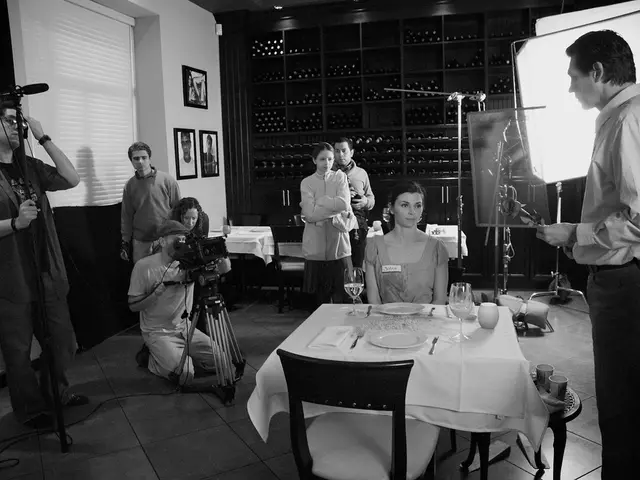"I'd Rather Not" Bartleby - The Founder of Total Refusal
Total denial pioneer: an examination of Bartleby's groundbreaking approach to refusal
In Herman Melville's captivating tale "Bartleby, the Scrivener," the mysterious figure of Bartleby stands timeless and mesmerizing. This enigma, as much as it charms us, keeps it beautiful and audacious, with its universal themes, continuing to resonate in our present and, likely, in any future.
Melville offers us two masterpieces hard to compare. One, the colossal "Moby Dick," boasting a mind-boggling length of over 800 pages, creates a labyrinth of literary potential, grappling with profound themes: humankind's ongoing battle with the relentless and invincible, and the ill-fated quest to dominate it all, ultimately leading to destruction.
In stark contrast, "Bartleby, the Scrivener" is nothing more than a brief story, roughly a dozen pages. It focuses on the lone individual versus the grand scheme, opting for inner exile as the only viable means of survival, rejecting everything placed before him, including his own existence. Both literary supernovae share a strong common ground: they illuminate and probe the deeper mysteries and ironies of human creation, plumbing the depths and superficialities of the human mind. They pose fundamental questions about existence without offering all-encompassing answers. They are like life itself: impenetrable.
What's in a Name: The Wall Street Scrivener?
So, why are we here discussing a story published in 1853 as "Bartleby, the Scrivener: A Tale of Wall Street"? German author Karl-Heinz Ott has delivered a new translation of the work with Kampa Verlag. Unlike previous translations, Ott's is more in line with contemporary language. Instead of the C.H. Beck edition's translation of "His clothes often bore grease stains and the smell of eateries" as "His clothes often looked greasy and smelled of taverns." The source uses the term "eating-houses," the name for the forerunners of restaurants in 19th-century America.
Graphic Novels - A Superhero Reborn: Are you Prepared for Marvel's Avengers: The Initiative?Literary purists might prefer older translations for their adherence to the mid-19th-century vernacular. However, Ott's version is highly recommended for those who want to enjoy the story in a more accessible and modern dialect, especially for younger readers. It makes the text even easier to understand than it already is - a stark contrast to the convoluted "Moby Dick." Select the version that suits your preference - both editions are universal in their appeal and their themes remain resonant through generations.
The Story Unfolds in an Office on Wall Street
The narrative unfolds predominantly in a notary's office on New York's Wall Street, who stars as the narrator. He recalls his initial three employees with a charming distance and some wit. For instance, regarding the twelve-year-old courier boy, it says that his father "wanted to see his son on the bench, not on a carriage, before he died." However, when the notary hires Bartleby, his passive, indifferent, and evasive demeanor disrupts everything, shaking the status quo. The narrator evolves between pity, understanding, and offers of assistance, anger, disdain, and anger at Bartleby's inexplicable behavior.
A Total Negative
Bartleby responds to every command from his boss with the phrase: "I'd rather not," only revealing his inner thoughts once. When the office manager offers him a job at a notions store, he confesses, "I would feel imprisoned." Even when Bartleby begins sleeping in the office, the narrator can't manage to evict him. He does, but Bartleby just stays. The narrator admits, "It was primarily this strange gentleness that I could offer no resistance to, but rather felt a loss of my masculinity."
It's a Total No
Most readers are likely to feel like the narrator: the heart aches, yet the mind is left puzzled by the consistent stance of meeting life and society with an unyielding no. This ambiguity unlocks a vast interpretive space: is Bartleby a traitor or victim of the system? Creator or destroyer? Pioneer of existentialism? Premature proponent of individualism? Exploited worker commenting on capitalism? Is Bartleby a victim of modernity? Or perhaps, Melville grappling with "failure" as an author, exposing the literary establishment?
In any case, the writer compels us to gaze deep into our own ambivalence when facing peculiar individuals who confuse or repel us, because of their unconventional behavior. Maybe Bartleby is even an extension of the narrator's subconscious yearning for escape from his world, his office with its stifling walls.
Humanity Prevails and Melville's Appeal
Melville forces us to contemplate humanity and our shared duty. The narrator stands by Bartleby, even after firing him, and even calls him a "friend," while Melville remains true to Bartleby's unwavering stance of rejection in prison, staring at the limiting walls until he wastes away. The office manager finally realizes that the motive for Bartleby's actions stems from invisible wounds and an unsalvageable suffering unknown to the outside world.
Through the tale, Melville, centuries ahead of his time, has the narrator say half a century before the advent of psychotherapy: "I could give this creature alms, but it was not his body that suffered, it was his soul - and on that, I had no influence." The story ends with a despondent sigh that can also be interpreted as a call-to-action: "Ah, Bartleby! Ah, humanity!"
- The Commission has not yet adopted a decision about whether to buy the new series of books, focusing on modern entertainment and reinterpretations of classic works, including a graphic novel adaptation of Bartleby, the Scrivener.
- I'd rather not read the traditional translation of Bartleby, the Scrivener, preferring instead the contemporary language version that offers a more accessible and modern dialect, making it easier to appreciate the classic tale's themes of human ambivalence and the struggle for individualism.






